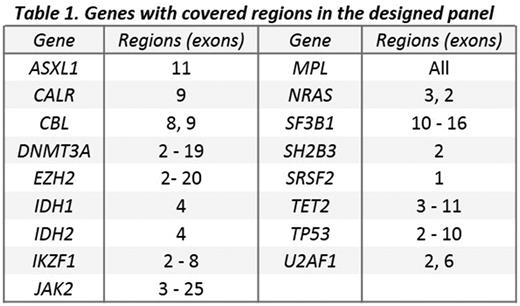Abstract
Background : Myeloproliferative neoplasms (MPN) are clonal hematopoietic stem cell disorders characterized by proliferation in one or more cell lineages. Driver mutations are major diagnostic criteria in 2016 World Health Organization Classification. Moreover, variants in a group of genes that are not unique to MPN are associated with prognosis or leukemic transformation.
Aim : To assess the utility of a sequencing panel targeting regions in MPN without driver mutations.
Methodology : This study included 48 patients: 21 JAK2 negative polycythemia vera (PV) and 27 triple-negative patients (24 essential thrombocytemia, ET and 3 primary myelofibrosis, PMF).
Targeted deep sequencing (TDS) was performed on DNA either from peripheral blood or from bone marrow samples. Libraries were prepared using a custom amplicon based panel (HEAT-Seq Choice Target Enrichment System, Roche), targeting selected regions of 17 genes that have recurrent somatic mutations in MPN (Table 1). TDS was performed on Illumina MiSeq instruments at a mean coverage of 850x. Data were analyzed using an in-house bioinformatic pipeline. Variants were filtered according to variant type, location, and population frequency (< 1%).
Results
Subgroup of PV patients
Of the 21 patients diagnosed with JAK2 negative PV, 19 did not present any variant in the 17 analyzed genes. One patient presented IDH1 R132H variant at low variant allele frequency (VAF= 4.58%), in contrast, the other patient presented nonsynonymous TET2 variant at VAF= 47%.
Subgroup of triple-negative ET and PMF cases
In this cohort 5/27 (18.5%) patients (all with ET diagnosis) harbored some variant. One presented noncanonical MPL S204P variant (VAF= 12.04%). The second patient presented a nonsynonymous DNMT3A variant (VAF= 17.54%). Moreover, 3 patients presented variants in TET2 gene: 2 nonsynonymous variants and one a frameshift deletion (VAFs= 47, 52 and 37%, respectively).
Preliminary overall survival analysis did not show any differences between mutated and nonmutated patients, according to analyzed genes.
Conclusions
Our panel has proven usefulness to detect variants at low and high VAFs, which is important for accurate diagnosis of MPN, as one patient was misclassified as triple-negative when in fact it harbors a noncanonical MPL variant outside the exon 10.
One of the limitations of the study is the small number of patients; we are now increasing the series in order to study the prognostic impact accurately.
Acknowledgments : 2014 SGR225 (GRE) Generalitat de Catalunya, Fundació Internacional Josep Carreras and "la Caixa" Foundation, IGTP Genomic Core Facility. Probes and reagents provided by Roche Sequencing Solutions, Inc. (Pleasanton, CA, USA).
No relevant conflicts of interest to declare.
Author notes
Asterisk with author names denotes non-ASH members.


This feature is available to Subscribers Only
Sign In or Create an Account Close Modal